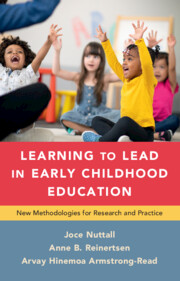Book contents
- Learning to Lead in Early Childhood Education
- Learning to Lead in Early Childhood Education
- Copyright page
- Contents
- Figures
- Acknowledgments
- Chapter 1 The Impetus for This Book: Our Early Childhood Leadership Think Tank
- Chapter 2 Nau mai e Hine ki te Aoturoa a tou tupuna a Tanematuai tiki ai ki roto o Matangireia i a Io Matangaro, i roto o Rangiātea a whata ana
- Chapter 3 Te Kete Aronui
- Chapter 4 Leadership as Change
- Chapter 5 Knowledge Possibilizing
- Chapter 6 A Cultural-Historical Activity Theory Perspective on Learning to Lead
- Chapter 7 Leading Organizational Change: The Case of Haneul Early Learning Center
- Chapter 8 A Conversation between Approaches
- References
- Index
Chapter 4 - Leadership as Change
Immanent Knowledge Practices for Emergent Educational Leaderships and Organizational Learning
Published online by Cambridge University Press: 17 August 2023
- Learning to Lead in Early Childhood Education
- Learning to Lead in Early Childhood Education
- Copyright page
- Contents
- Figures
- Acknowledgments
- Chapter 1 The Impetus for This Book: Our Early Childhood Leadership Think Tank
- Chapter 2 Nau mai e Hine ki te Aoturoa a tou tupuna a Tanematuai tiki ai ki roto o Matangireia i a Io Matangaro, i roto o Rangiātea a whata ana
- Chapter 3 Te Kete Aronui
- Chapter 4 Leadership as Change
- Chapter 5 Knowledge Possibilizing
- Chapter 6 A Cultural-Historical Activity Theory Perspective on Learning to Lead
- Chapter 7 Leading Organizational Change: The Case of Haneul Early Learning Center
- Chapter 8 A Conversation between Approaches
- References
- Index
Summary
The work of philosophers Giles Deleuze and Felix Guattari is drawn on in this chapter to make a case for looking beyond discourses of accountability and quality improvement for leaders in early childhood education and embracing more fully the affective dimensions of this work. In engaging with the inevitability of change, the chapter upends ideas about rationality, individualism, and time, turning instead to understanding the “leadership event” as complex, integrated, holistic, and laden with affect. Concepts and practices of group-decentered writing projects are introduced as a way of manifesting the ethical and embodied nature of work in early childhood education. An argument is made for the development of a “rhizomatic writing machine” to allow leaders to fully embrace the liminal, and even unconscious, aspects of the development of their subjectivities as leaders as they work in constant states of change and flux.
- Type
- Chapter
- Information
- Learning to Lead in Early Childhood EducationNew Methodologies for Research and Practice, pp. 53 - 77Publisher: Cambridge University PressPrint publication year: 2023

